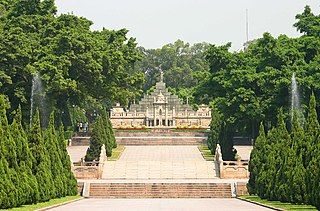See also
| This disambiguation page lists articles associated with the title Xinhai. If an internal link led you here, you may wish to change the link to point directly to the intended article. |
Xinhai or the Xinhai revolution occurred in the Xinhai year of the sexagenary cycle.
Xinhai may also refer to:
| This disambiguation page lists articles associated with the title Xinhai. If an internal link led you here, you may wish to change the link to point directly to the intended article. |

The Tongmenghui was a secret society and underground resistance movement founded by Sun Yat-sen, Song Jiaoren, and others in Tokyo, Japan, on 20 August 1905. It was formed from the merger of multiple Chinese revolutionary groups in the late Qing dynasty.

Meixian, formerly Meihsien, is a district of Meizhou City, in northeastern Guangdong Province, China.
Xinhai Geming or Xin Hai Ge Ming may refer to:

The Sun Yat Sen Nanyang Memorial Hall, also known as Wan Qing Yuan, and formerly as the Sun Yat Sen Villa, is a two-story colonial style villa in Balestier, Singapore. The villa is now a museum commemorating Sun Yat Sen (1866–1925), the founding father of the Republic of China who visited Singapore nine times between 1900 and 1911.

The Fengtian clique was one of several opposing military factions that constituted the early Republic of China during its Warlord Era. It was named after Fengtian Province, and operated from a territorial base comprising the three northeastern provinces that made up Manchuria. Warlord Zhang Zuolin, known as the "Old Marshal," led the clique with support from Japan.
Xinhai Lhasa turmoil refers to the ethnic clash in the Lhasa region of Tibet and various mutinies following the Wuchang Uprising. It effectively resulted in the end of Qing rule in Tibet.

The Second Guangzhou Uprising, known in Chinese as the Yellow Flower Mound Uprising or the Guangzhou Xinhai Uprising, was a failed uprising led by Huang Xing and his fellow revolutionaries against the Qing Dynasty in Guangzhou. It is honored in Guangzhou's Yellow Flower Mound or Huanghuagang Park.
The Draft History of Qing is a draft of the official history of the Qing dynasty compiled and written by a team of over 100 historians led by Zhao Erxun who were hired by the Beiyang government of the Republic of China. The draft was published in 1928, but the Chinese Civil War caused a lack of funding for the project and it was put to an end in 1930. Both of the current regimes claiming Greater China have attempted to complete it.

Anti-Qing sentiment refers to a sentiment principally held in China against Manchu rule during the Qing dynasty (1636–1912), which was criticized by opponents as being barbaric. The Qing was accused of destroying traditional Han culture by forcing Han to wear their hair in a queue in the Manchu style. It was blamed for suppressing Chinese science, causing China to be transformed from the world's premiere power to a poor, backwards nation. The people of the Eight Banners lived off government pensions unlike the general Han civilian population.
The Gelaohui, usually translated as Elder Brothers Society, also known as Futaubang, or Hatchet Gang, as every member allegedly carried a small hatchet inside the sleeve, was a secret society and underground resistance movement against the Qing Dynasty. Although it was not associated with Sun Yat-sen's Tongmenghui, they both participated in the Xinhai Revolution.
The Xinhai Revolution in Xinjiang refers to the fightings of the members of Anti-Manchu Revolutionary Party (反清革命党人) in Xinjiang during the Xinhai Revolution. The Revolution mainly took place in Yili.
The concept of martyrdom in China during the premodern period largely concerned loyalty to political principles and was developed in modern times by revolutionaries, such as the Tongmenghui and the Kuomintang parties during the Xinhai Revolution, Northern Expedition, and Second Sino-Japanese War.
The Chinese Revolution can refer to:

The Founding of a Party, alternatively titled in English Beginning of the Great Revival for its international release, is a Chinese film released in 2011 to mark the 90th anniversary of the Communist Party of China. The film is directed by Huang Jianxin and Han Sanping, both of whom also worked on the similar historical film, The Founding of a Republic, and features a star-studded cast of Chinese actors, including Andy Lau and Chow Yun-fat. The film was created by the state-owned China Film Group and depicts the formation of the Chinese Communist Party, beginning with the fall of the Qing Dynasty in 1911 and ending with the Party's founding congress in 1921.

The 100th anniversary of the founding of the Republic of China began on 10 October 2011 on the 100th anniversary of the Xinhai Revolution. It was celebrated in Taiwan and mainland China, but the connotation and significance of the celebration varied by region.

1911, also known as Xinhai Revolution and The 1911 Revolution, is a 2011 Chinese historical drama film. The film is a tribute to the 100th anniversary of the Xinhai Revolution. It is also Jackie Chan's 100th film in his career. As well as starring in it, Chan is also the executive producer and co-director of the film. Co-stars include Chan's son Jaycee Chan, Li Bingbing, Winston Chao, Joan Chen and Hu Ge. This film was selected to open the 24th Tokyo International Film Festival.

Tōten Miyazaki or Torazō Miyazaki was a Japanese philosopher who aided and supported Sun Yat-sen during the Xinhai Revolution. While Sun was in Japan, he assisted Sun in his travels as he was wanted by Qing dynasty authorities.

1911 Revolution is a Chinese television series based on the events of the Xinhai Revolution, which brought an end to imperial rule in China in 1911. It was first broadcast on CCTV-1 during prime time on 27 September 2011. It was specially produced to mark the 100th anniversary of the Xinhai Revolution.
The 1910 Chinese expedition to Tibet or the Chinese invasion of Tibet in 1910 was a military campaign of the Qing dynasty to establish direct rule in Tibet in early 1910. The expedition occupied Lhasa on February 12 and officially deposed the 13th Dalai Lama on the 25th.
The following lists events that happened during 1911 in China.